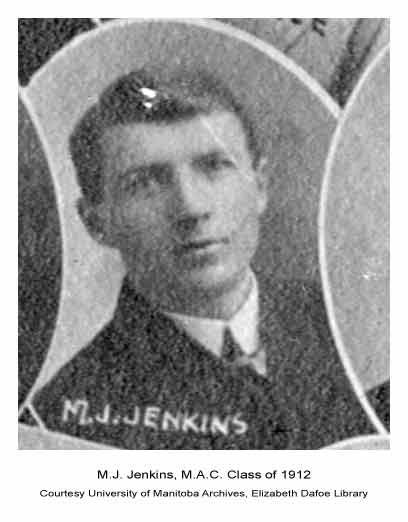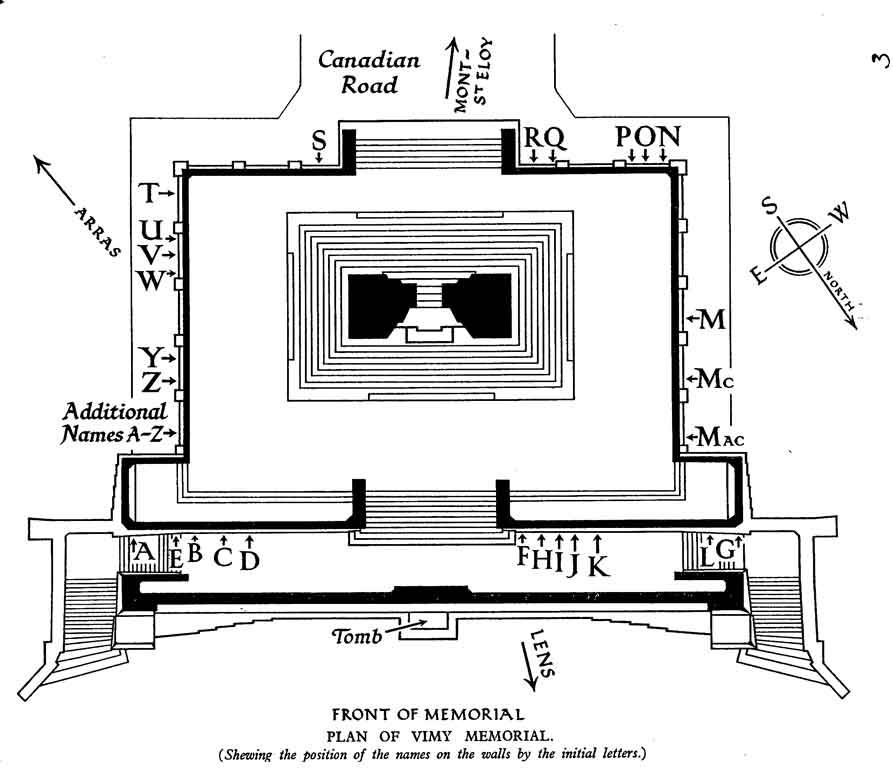
SSNS Home > Senior Years > Curricula 9-12 > Grade 11 > Canadian History > Remembrance Day > MAC Soldiers > Jenkins

Jenkins, Morgan Jones, Meadows, Manitoba, Class of ‘16. Military Service: Lance Corporal, Reg. No. 475898 (McGill 892), 3rd University Co., Princess Patricia’s Canadian Light Infantry, Attestation Papers. Diary Reference: “Jenkins L.C. missing believed killed in Arras battle” 7:30 November 1918. Picture of him available.
Additional Biographical Information:
1913-1914
M. J. Jenkins, ’16. Jenkins is making good use of his talents this winter on the farm at Meadows, Man. Most of us will remember him as one of the International debating team last year. Those who were acquainted with him in the summer as well as during the college months know that his capacity as a debater and public speaker is only second to his ability as a practical farmer. Next year we hope he will resume his studies here and again grace our halls for his presence.
M.A.C. Gazette, V. VII, No. 5, (Feb 1914), 324.
1915
Extracts from Letters received recently.
M. J. J. 475898, P.P.C.L.I., St. Martin’s Plain, Shorncliffe, 16 October 1915.
I’ve been on the point of writing you for some considerable time, but now that I’ve settled down to it I don’t know where to begin. I little thought that when I saw the Duke of Connaught reviewing the second contingent last March that within six months I’d be in his daughter’s particular regiment, but here I am, and enjoying it very much. I’ve tried to describe the life time and time again, but the longer I’m in the regiment the less able I feel to express my feelings properly. As the old lady said, “The proof of the pudding is in the eating.” I have not felt so boyish and full of life for a long time; as a matter of fact, we are just a bunch of grown-up kids; nothing seems to worry us. The fellows seem purposely to push into the background all deeper feeling, but I can tell it is there just the same.
In common with other Old Country fellows who came over on the same boat, I felt somewhat disappointed when I landed in England. I felt I wasn’t going home, but that I had left home when I lost sight of Canada. I hardly thought that five years would make me feel so Canadian.
We sailed from Montreal on the first Friday in September [3 September 1915] on the Missanabie. There were 1,500 troops on board, made up of drafts from various battalions. The first day we were on board I ran into Blake and Blows. Naturally we had a good old chin wag. The next morning I was rushing round a corner in a hurry when I bumped into a fellow. I looked up quickly to swear at him before he swore at me, but he beat me to it. You can judge my astonishment when I heard, not a malediction, but “Hello, Taff, where on earth did you spring from?” It was T. L. O. Williams, my first room-mate at the M.A.C. Before the end of the voyage we found there were ten M.A.C. men on board. We got together one Sunday and had our photograph taken. I believe Betts has sent you a copy of it.
There were A. G. Blows, C.A. Blake, ___ Forbes, G. Tarrant, and C. H. Simmonds in the 44th; T. L. O. Williams in the 45th; E. Muir and L. Cox in the Lord Strathcona’s Horse, and W. Betts and myself in the P.P.C.L.I. Not too dusty, eh?
Believe me to be,
Yours ever,
Morgan J. Jenkins.
University of Manitoba, Archives and Special Collections, M.A.C. Gazette, v. X, no. 1 (Nov. 1916), 19-20.
1915
Jenk’s Gets Busy
No. 475898, P.P.C.L.I., St. Martin’s Plain, Shorncliffe, 28th October, 1915.
Hullo, Dad, I suppose you are working to beat sixty at anything and everything but botany, drawing, chemistry and ten or eleven more subjects I’ve not time to mention. The letter I get from you every week fills me full of joy and shows me you are still the same old buck. No doubt you could write oftener still had you not your weekly budget to attend to – I guess that this year there is another correspondent added to the list.
That was some Saturday we put in at the Peg. Lets hope we get several more.
Have you still the same seat in Jackson’s class room and do you still argue to beat the band? All the same, Jackson wasn’t far wrong when he said that was the way to make things stick. I can remember still several chin wags, notably about our deal [sic – dear] old pal Bateson – his name should be spelt Batty son – whom otherwise I should have forgotten long ago. “From the complex to the simple,” and “Inhibition.”
This applies to soldiering alright. In the time of Caesar a good soldier had to be able to use a sword or a bow and arrows. Nowadays a good soldier has to inhibit such complicated accomplishments and simply has to be able to use a pick and shovel, drill a mine, erect barb wired entanglements, know a rifle from foresight to butt plate, throw bombs accurately, carry a 60-70 lb. pack on his back, know something of first aid, know two or three different codes of signalling and last but by no means least, be courteous to the ladies.
In other ways, too, I’ve gone from the complex to the simple. I’ve inhibited cream toast and hash – I don’t even miss them now – and can enjoy just plain bacon, beef or jam. I’ve inhibited the complex wrinkled pea[o]logy and Broderickology and now can crawl along on my stomach on a scouting trip or hit an object 200 yards away with a bullet with more or less frequency.
The other night I had a brilliant idea. I shuffled a pack of cards and tried the colored pea stunt with them. I then bet some guys that on dealing the cards out two at a time the number of black pairs would always be the same as the number of red pairs. I won 30 shillings in no time. Hurrah for wrinkled peaology!
I’m putting in a swell time, am as fit as a fiddle, and could keep old Brad in order easier even than I did last year. Without any kidding, Dad, I wouldn’t have missed the experience I’ve gained in the last few months. A fellow picks up more about “life” and people in a month than he does in civilian life in a year.
We’re all about to go across to the front, and hope we go soon, as we don’t want to have to go across in January or February in the worst part of the winter.
Remember me to all the boys and tell Andy that if he isn’t careful he will get a letter from me before I get one from him. In which case there is likely to be something doing. Yours as ever, Jenks.
University of Manitoba, Archives and Special Collections, M.A.C. Gazette, v. X, no. 2 (Dec. 1916), 24-25.
1916
Pte. M. J. Jenk[in]s, 475898, No. 3 Co. P.P.C.L.I. C.E.F. France, 3rd February 1916.
If you want some idea of how my short experience of army life, here goes: I well remember the day I enlisted and a chat I had with two fellows who enlisted at the same time I did. Each of expressed our views of what we expected life in the army would be like. None of us was pessimistic at all, but had we taken a much more rosy outlook we would still have fallen far short of what army life is really like. The best way I can express it is to say that my experiences have been a series of surprises right through. Our first period of training took place in Montreal, then we went to Shorncliffe, England, and then to Havre in France.
I look upon my seven weeks’ stay in Montreal as the best holiday I’ve ever spent. Perhaps I should not say very much about this first period of training because our company was more fortunate than is usually the case. This was due to the highly patriotic and able action of McGill University. They allowed us the use of the college campus for drill purposes and billeted us free of charge in the Union and the college buildings. We had very little wet weather. Our O.C. gave us every possible liberty when he found that the fellows did not abuse any privileges granted them. We crossed over to England on the Missanabie[1] in September, with a number of drafts from various Canadian battalions and on board were ten M.A.C. men.
We expected on our arrival at Shorncliffe that we would have to rough it in earnest, but we found comfortable corrugated huts awaiting us into which we were settled without any fuss or confusion. Indeed we were a little disappointed, we expected that the sudden arrival of nearly 2,000 troops would have caused a little commotion or at any rate a mild sort of interest. As a matter of fact we were just absorbed and two hours after our arrival a stranger unless actually told of the fact would have noticed no difference at all in the camp. [np] Our training at Shorncliffe, of course, was a little more rigid than at Montreal, but we hardly noticed this as our preliminary training in Montreal put us in good condition to cope with the extra work. We seemed to be getting fitter and more effective unconsciously and when some special test would be sprung upon us we would invariably be surprised at the ease with which it would be accomplished.
We were down in Le Have [Le Havre] almost two months and the same forethought and organization was apparent there as in England. I think we enjoyed being at the Canadian Base Camp more than we did at Shorncliffe because we appreciated more in France the efforts exerted for our welfare and did not take them so much as a matter of course.
The outstanding feature of our life at the Base Camp was the great part played in it by our friends and relations at home. Each camp has a large Y.M.C.A. hut in which refreshments are served and concerts, debates, etc., are held. Writing materials are provided free of cost and there are lending libraries in connection with each hut and all kinds of games can be indulged in by the men, including billiards, chess, draughts and dominoes. During the long winter evenings one need never find time hand heavily on one’s hands, as one always has the choice of patronizing [p. 64] any of three moving pictures shows, and special concerts and lectures are always being held in the various camps.
All the work in connection with the Y.M.C.A. huts is undertaken voluntarily by ladies from England, and we owe these and the numerous friends who have made possible the erection and carrying on of these huts a debt of gratitude impossible to express.
Up here in the trenches it is surprising how quickly we have fallen into line. To be drafted in among men who have made such a glorious name for their regiments and to notice how they “carry on” under fire gives a recruit confidence and steadiness in a very short space of time.
I am writing this in a barn, sitting on some straw with my back up against a wall and using my knee as a writing desk. My table fork is stuck in the plaster above my head and a candle rests on the fork handle. This may be looked upon as a hardship by those who have every convenience handy for writing, but in actual experience one does such things almost without thinking of the novelty of it. I am inclined to think that “hardship” is a dog whose bark is much worse than its bite. The men who spent last winter in the trenches certainly had to put up with severe hardships, but today those hardships are almost entirely a thing of the past.
I understand a large number of M.A.C. men intend enlisting in the spring. It is jolly good news and I can safely guarantee that hardly a one will regret taking such a step. Experience has shown that the Canadian farmer has no superior as a soldier. He has always been accustomed to deal with practical difficulties, he is the type of handy man most in demand at this time and his long hours of labor in the open field have given him a constitutional physical advantage which stands him in great stead.
The boys who left Canada last winter have made glorious history and under adverse conditions such as are not likely to occur again. We who are here now will need the help of the best – the very best – of you who are at home if we are to maintain the great reputation those fine fellows made for Canada and the Canadians.
University of Manitoba, Archives and Special Collections, The M.A.C. Gazette, v. X, No. 5, (March 1917), 63-64.
1917
Undergraduate, M. J. Jenkins, 475898, 3rd Univ. Co., P.P.C.L.I.
University of Manitoba, Archives and Special Collections, Managra, v. XI, No. 1 (Nov. 1917), 8.
1918
Morgan Jenkins.
“There is one thing we fellows out here miss very much, and that is a practical scheme of wireless telepathy. Letter writing even in the best of times was not a regular pastime of mine, but since I have been in France it has degenerated to annual letters to my friends. With the aforesaid W.T. we could hold constant converse as things are always cropping up to remind me of you all at the M.A.C. In the summer time especially are my thoughts turned along biological channels. When I return to the M.A.C. I shall pursue with great interest the study of the structure of metamorphosis of parasites, pests and reptiles, as I have had practical experience of their industry and perseverance, to say nothing of their dentition. We are on the eve of casting our votes for the Dominion election. We can only vote one way, of course. I am most pleased and we are being given the chance of voting by ballot. It shows better than anything else could, I think, the moral of our men and the trust placed in us by our government. Can you imagine the Hun soldiers being given the chance of voting whether the war should go on or not?
Personally, I am in the lap of luxury compared with what the fellows in the front line have to put up with. I have three hot meals a day and a bed at night, and what that means it is beyond me to describe. This Russian fiasco and the Italian reverses have just served to stiffen up the boys, and they are facing the prospect of another winter in the trenches even more steadfastly than they did last year, if that were possible, though they realise clearly that there is not going to be much letting up on account of climatic conditions All will be well as long as we have Horatio Bottomley and Beech Thomas to liven us up, but if anything should happen to either of these humorists we would suffer a reverse almost impossible to recover from.
With kindest regards to Mrs. Jackson and yourself, as well as the other members of the staff I know, and Happy Christmas to you all.
Very sincerely yours,
(signed), Morgan Jenkins.
University of Manitoba, Archives and Special Collections, The Managra, v. XI, No. 3, (Jan. 1918), 31.
1923
Jenkins, Morgan Jones: Agric ’17 Enlisted 7-8-15; L/C 3rd Univ. Co. PPCLI, Service in France; Killed in action 28-8-18.
University of Manitoba, Roll of Honour 1914-1918 (Winnipeg: University of Manitoba, 1923), 72.
Date of death: 28 August 1918. See casualty details, Commonwealth War Graves Commission. Memorialised at Vimy Memorial, Vimy, Pas de Calais, France.


Click on the footnote number to return to the text: